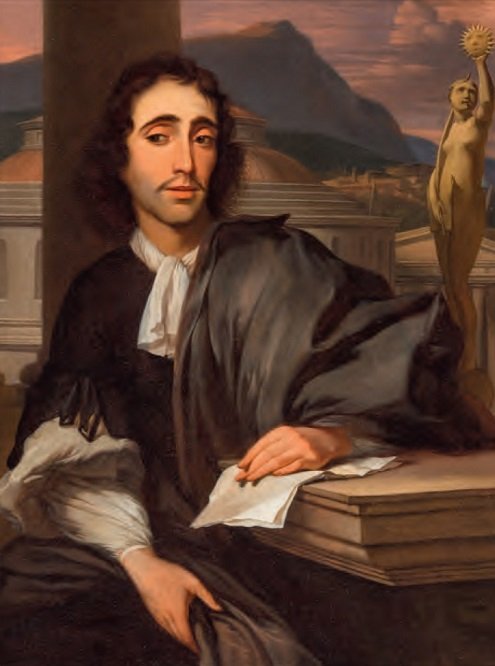Spinoza - Theology and Politics and John Locke - Liberalism and Democracy
Spinoza - Theology and Politics
Spinoza's first task is to reject the theological teachings for society and the state, in particular to free the state from the complete ideological monopoly of theology. In fact, he first creates theoretical, ideological and even psychological prerequisites for the formulation of one of the basic principles of the new political power - the principle of separation of the state from religion and the church. By justifying the need for a "treaty state" in a similar way to Hobbes, Hobbes proceeds from the "man to man is a wolf", and Spinoza emphasizes the maxim "man for man is God" (people are guided by reason). By distinguishing natural and civil law. The closest to the natural right in the scheme of democracy is that it is transferred to a person (monarch) or to several persons (the aristocracy), but to all, that is, to the majority, to the whole, whose part is each individual. A major contribution to political theory is also the Spinoza 's teaching on the Freedom of Man in a natural and civil state (as a citizen of the state). He first defines freedom as a conscious necessity, including the nature of the country's (and its laws) The state can not regulate everything if it does not want to take away what man makes him. It can regulate his actions, but not his thinking.
John Locke - Liberalism and Democracy
Nowadays liberalism owes much to John Locke. In many ways, its starting points must be sought precisely in the political philosophy of Locke. At the heart of Locke's socio-political views are his philosophical ideas. In philosophy and the theory of cognition continues the line of English empiricism of Bacon, and the basis of human knowledge is the experience. The dominant role of the idea of the right of the majority (not of the individual or of a small privileged group - the king or the aristocracy) over the minority's right in political and legal views also corresponds to this philosophical premise. In the first treatise, the medieval and patriarchal concepts of the divine origin of absolute monarchical power are subject to acute criticism. Locke builds its understanding of state governance and political society on the basis of the so-called "natural state" before people agree to live in a country and become its "citizens." According to him, people in their natural state can not effectively protect their lives, their freedom and their property, because everyone is fighting against everyone and there are no factors to respect it. In the natural state, there are no three main levers, with which the state effectively protects the person and the property: 1) Generally accepted and acknowledged law, 2) A knowledgeable and non-addictive judge, 3) A force that ensures the implementation of laws and punishes their offenders. That is why people voluntarily give up their natural freedom and divorce and restrict their natural rights by passing some of them to state power. In Locke's analysis, liberalism and democratization dominate as fundamental political values that pierce all its political science. In the political thought of the 17th century there are two main types of theories about the origin of the state: 1) Theological, patriarchal and patrimonial; 2) Theories supporting the idea that the "contractual principle" is the basis for the emergence and proper functioning of the state the political community. Interesting and new thoughts Loke also develops in the analysis of the forms of government and the distribution among the various authorities. Locke justifies the supremacy of the legislature with respect to the executive. It accepts the constitutional monarchy as the best form of government, and on this basis it rejects not only the absolute monarchy but also liberal republican ideas. Special attention must be paid to Locke's main motive in justifying the objectives and functions of government - protecting citizens' rights and freedoms, on the one hand, and ownership (in the broad sense of the word), on the other.
Finally, we will address another Locke idea, which is the subject of contradictory interpretations in the history of political thought. It is about the right of the people to use force against power when it plots its own rights with force. The three main problems of Locke 's political philosophy are: 1) Limiting political power, 2) The right to property, 3) Religious tolerance

Nice read. I leave an upvote for this article thumbsup
Thank you :)
To listen to the audio version of this article click on the play image.

Brought to you by @tts. If you find it useful please consider upvoting this reply.
Also, he delineates the relationship between master and slave, which serves as base to Hegel's negative dialectics.
I would't say his treatise proposed a similar understanding of State as Hobbes, though.
Spinoza is one of my favourite philosophers, I think his work is a very intricate, complex (and incredibly beautiful) philosophical system and he's influenced authors I also like, such as Hegel and Nietzsche. I love the fact that all my favourite philosophers are somehow connected: Spinoza was an avid reader of Machiavelli and Giordano Bruno.